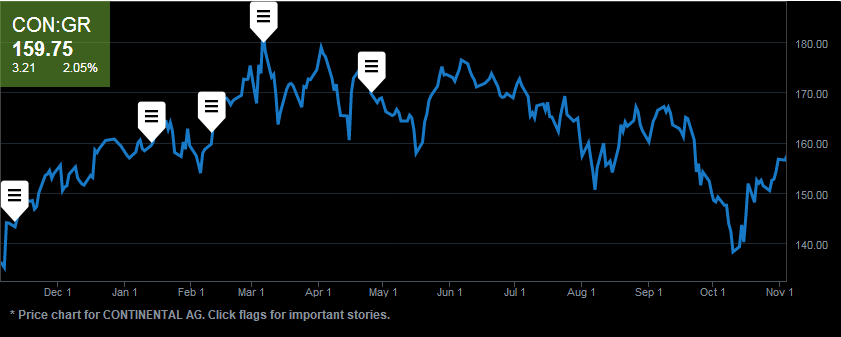Continental AG (CON), Europe’s second-biggest maker of car components, stuck to its 2014 profitability forecast as raw-material costs fall.
Earnings before interest and taxes, and excluding one-time items, acquisitions and disposals, will total 11 percent of sales, Hanover, Germany-based Continental said today in a statement.

“We even consider it realistic that we may slightly exceed this level,” Chief Executive Officer Elmar Degenhart said in the statement.
Continental, also Europe’s second-largest tire producer, has followed German carmaking customers such as Bayerische Motoren Werke AG into emerging economies to reduce the effects of a six-year auto-market slide at home. It’s also looking at acquisitions in other industries to free itself from dependence on supplying vehicle manufacturers. Rubber prices touched a five-year low during the third quarter, and Continental predicted a further decline in the full-year average price.
“Geopolitical uncertainties remain, so it would be prudent to stick to the previous profit guidance,” even as “currency effects remain low and raw materials costs have declined,” Frank Biller, Stuttgart-based analyst at LBBW, said ahead of the report.
Michelin & Cie. (ML), Europe’s largest tiremaker, scaled back its 2014 volume-growth forecast after third-quarter revenue missed analyst estimates as slowing car-industry demand and currency shifts hurt sales. Both Michelin and Faurecia SA, Europe’s largest maker of car interiors, are cutting expenses in their home market by eliminating jobs while adding production and customers abroad.
Continental’s third-quarter adjusted Ebit declined 5.9 percent from a year earlier to 962 million euros ($1.2 billion) missing the 980 million-euro average of eight analyst estimates compiled by Bloomberg. Revenue rose 3.8 percent to 8.67 billion euros. The adjusted operating margin narrowed to 11.3 percent of sales from 12.2 percent.
The average price of natural rubber will probably amount to $1.86 per kilogram versus an earlier prediction of $2.10, Continental said. The company also said it’s scaling back battery-cell activities in a joint venture with South Korean partner SK Innovation.
– Bloomberg





























